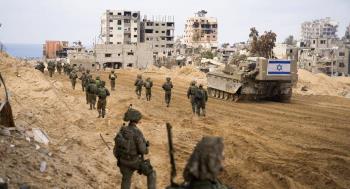Alwaght - Daveed Gartenstein Ross, a senior fellow at the Foundation for Defense of Democracies and an adjunct professor at Georgetown University and lecturer at the Catholic University of America, in a speech at the New America Foundation think tank in Washington, stated: “the Arab spring led to changes in the Middle East (West Asia) whose effects are still visible. Arab spring empowered groups in the region which had jihadist attitudes, and they emerged much more powerfully. The advent of jihadist elements was accelerated by changes occurred in the region and made way for the activity of these groups. One of the most important groups developed in this new era, was the ISIS (Takfiri Zionist) group. Tongues of fire lit up by the ISIS have been ongoing. The scope of activities of the ISIS has also drawn to the West; however, in a way that was not contemplated. Paris attacks or San Bernardino County in California highlight this issue. Young jihadist elements are inspired by the group. ISIS extremist group is very different from al-Qaeda. The ISIS group has managed to expand its activities in a scope much broader than that of al-Qaeda. These two groups have similar ideologies and common objectives, but different approaches. Al-Qaeda intended to take advantage of the atmosphere created after the Arab Spring and disseminate its own interpretation of Islam after the collapse of dictators in the regional countries. But the conditions actually gave rise to extremist groups such as ISIS Takfiri group. Al-Qaeda, the same as ISIS is not afraid of massacre. Nevertheless, al-Qaeda suffices to massacres, while ISIS advocates bloodshed and massacres in its worst possible way, and does publicize it."
He added: "Al-Qaeda and ISIS are both the enemy of Shia, but they employ different approaches. Ayman al-Zawahiri, Al-Qaeda leader says in messages to his advocates that they should treat Shia in such a way that does not damage to the reputation of al-Qaeda. But in areas such as Yemen in which the Shia have a very strong presence, al-Qaeda has pursued a very tough approach against the Shia, as Yemen is the battlefield between the Shiites and Sunnis. Iran-backed Houthis are also Shia. Al-Qaeda leaders in Yemen call Shia the main enemy of Islam. This approach is slightly different from that of Ayman al-Zawahiri, because he has more radical ideas about the Shia. In general, al-Qaeda leaders believe they should not create unnecessary problems for the Shiites. But in regions like Yemen that they can exploit the Shiites, al-Qaeda also adopts a totally anti-Shia approach. Al-Qaeda believes it is not yet the right time for establishing its own version of the Islamic caliphate. However, ISIS has a totally different view and believes that ISIS should establish the Islamic caliphate. Al-Qaeda believes that instability should gradually increase in the region, and in the long run this could be to al-Qaeda’s advantage. For this reason, the activities of the ISIS are totally to al-Qaeda’s advantage, as they generally lead to instability in the region."
Gartenstein Ross went on to say that in the fight against ISIS, the United States should apply its own power levers in the region. The US needs Turkish Incirlik air base to target the positions of ISIS in Iraq or Syria. However, the US officials must know that Turkey needs the United States much more than Washington do. ISIS as an issue has constituted far more serious challenges for Turkey than for the United States. The US must recognize its positions of influence and strength and make use of them. While adopting this approach, the United States can win a few concessions; however, the United States should reconsider its policies. From the perspective of the US policies, the West Asia region may also have a different function."


























